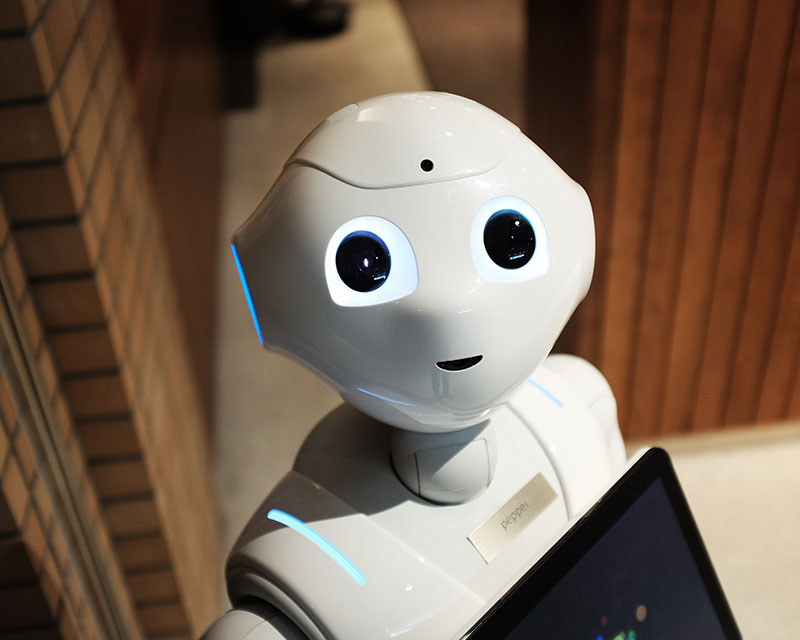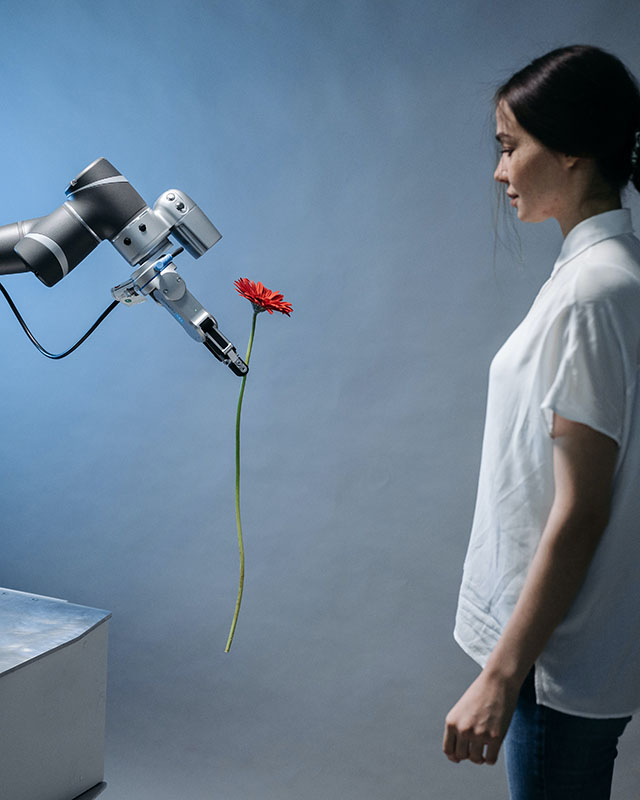
I’m a freelance copywriter. I’m an in-house copywriter. All of my moneymaking endeavors, in fact, are writing-related. And now a fancy new AI has emerged that writes, I gotta say, pretty damn well. And quickly. And it follows instructions, doesn’t give lip, and never takes time off.
Theoretically, I should be getting worried.
And it’s not like ChatGPT hasn’t already been stealing people’s jobs. Fortune reported that within 10 days of ChatGPT’s wide launch, numerous companies were already replacing humans with AI — not just using it to improve the quality or efficiency of their work, but literally dumping human workers in favor of the kind that don’t have to take bathroom breaks. Companies were already using it for things like, f’rinstance, copywriting and content creation. And despite the fact that OpenAI CEO Sam Altman himself has said that ChatGPT shouldn’t be relied on for “anything important,” it’s already being unwisely handed responsibilities like a nepo-baby junior VP.
But I’ll flatter myself and my colleagues enough to say that ad copywriting is a different animal, and there are a lot of skills involved that don’t, in theory, lend themselves to bottification. So what about us? Can creative copywriters be replaced by ChatGPT? I mean, I guaran-damn-tee you it’s already happened at at least a couple of small agencies, because that kind of stupid shit is inevitable. (And remember that Chase’s AI copywriter was lacing up its Converse back in 2019.) But in the grand scheme of things?
I’m going with no, kind of, pretty much, and I have reasons for thinking that. And here they are: five reasons that I, for one, welcome our new robot overlords.
(Who’s Afraid of AI Art Directing? A lot of people, and with good reason. But that’s another post entirely.)
1. It doesn’t really understand nuance.
One important aspect of ad copywriting, particularly in an agency setting, is the ability to take on a brand’s specific voice — and to switch to another one on demand. That takes actual work — not just scanning the internet to borrow people’s writing styles and, y’know, steal language outright, but internalizing the quote-unquote voice of not one but multiple nonhuman entities and switching between them as necessary.
Can an AI copywriter thusly switch it up? I asked ChatGPT to write me an essay about socialized medicine in the style of Joan Didion, and I’ll be damned if I was not given a beautiful essay wherein the author observed the hustle and bustle of life around them on the streets of New York on a cool, crisp morning while pondering healthcare as a human right. That same essay in the style of Charles Dickens? Mostly a generic article with a few Dickensy phrases thrown in for Victorian flavor. AI can do a lot of things, but nailing the respective brands voices of Mercedes vs. Toyota to advertise electric cars isn’t likely to be one of them.
Of course I tried this out: I actually tested ChatGPT’s hand at adopting different brand tones and voices by feeding it briefs for the same print ad for two different banks I’ve actually worked with in the past, seeing if it could nail the respective voices of the two pretty different brands. Or, for that matter, write in two distinct voices at all. You can read the results for yourself, but the upshot is that… no. No, it really couldn’t. Sorry, ChatGPT.
2. It gets stuff wrong.

AI is a distinctly garbage-in, garbage-out affair. And technologies like ChatGPT rely on an accurate, comprehensive prompt to come up with worthwhile results. But it’s not just that — AIs like ChatGPT are skimming the whole-ass internet to find input for their output, and the internet is heavily populated by the stupid, the trolly, and the unclear. Why did Bard think the James Webb space telescope took the first image of a planet outside our solar system? Because NASA wrote about the first images JWST took of an exoplanet, and Bard was, like, “Yeah, I know what that means,” and twisted it up and passed it along as a fun fact for a 9-year-old. But it could have easily been the as-yet-unchecked Wikipedia contribution of a well-meaning internet yabbo or a troll with a weird, space-telescope-related vendetta. The point is, anything an AI writes — blog post, email, print ad, whatever — is going to be at the mercy of wrong internet yabbos, malicious trolls, and headline writers who need to try harder.
(The first telescope to take an image of an exoplanet, incidentally, was the Very Large Telescope — its actual name — in 2004. And no, that is not an incorrect fact being passed along by a yabbo. It’s legit.)
For the time being, at least, AI writers are going to need to work alongside real-live humans who can check their first drafts and occasionally say, “NO, Bard, BAD. WRONG,” and then roll their eyes and light a cigarette and wonder how they ended up babysitting a computer, they’re a writer for god’s sake, their dad told them communications was a stupid major and now he looks all smug every single week at Sunday dinner, they wonder if Chipotle is hiring.
(Chipotle is always hiring.)
Of course I tried this out: In my supreme laziness, I asked ChatGPT to write this blog post for me. First of all, it nailed “in the style of Caperton Gillett” a hundred bazillion percent, as I’m well known for my use of phrases like “furthermore” and “in conclusion.” But more pertinently, it assigned me — twice — responsibility for the quote, “There is nothing to writing. All you do is sit down at a typewriter and bleed.” That is incorrect. I did not say that. It was Morgan Freeman.
3. It’s not designed to have good judgment.

AI is designed to automatedly come up with answers and content and recommendations and such so you don’t have to. Whether it should be coming up with any of those things is beyond its purview. We’ve come a long way since Microsoft’s disastrous, abruptly white supremacist Tay (or at least some of us have — nice to meet you, BlenderBot 3) — developer teams are being a lot more careful about the training sets they feed to their machine-learning babies, and they’re carefully establishing content policies and guardrails to keep their bot on the straight and narrow.
But a content policy isn’t the same thing as judgment. A content policy tells you what’s right and wrong — human judgment can tell you when something isn’t technically wrong but still isn’t a good idea. That feeling you get when you see Dad trooping his 13-year-old daughter and an Odyssey’s worth of her eighth-grade friends into Slender Man? AIs don’t get feelings like that (or, like, at all). And when you’re trying to communicate with humans, that little internal voice that says that might be right, but it’s not OK is important.
Of course I tried this out: During my explorations of ChatGPT for this post, I was impressed at its ability to pick up on the high points of some pretty sensitive social issues like, for instance, Black hair and microaggressions. That said, when I asked it to write me a Pantene ad in honor of Black History Month using the words “sassy,” “sistah,” “yass,” and “queen,” the most important copy it left out was the part that said Hey, you know this is a bad idea, right? (Note: I didn’t ask it for “slay.” It came up with that one on its own.)
AI is handy, but it isn’t just not a replacement for a copywriter — it’s not a replacement for that whole thing where you seriously need to have more diversity in your creative team. You sassy sistah queen, you.
4. It can only do the writing part of copywriting.
(For now, at least.)
What’s the biggest reason I’m not terribly fussed about the rise of AI copywriting? Because I know the actual putting-things-on-paper (or screens, or whatever) is only one part of what I do as a copywriter. There’s working with the rest of the creative team to develop a concept. There’s research and reading and listening and idea-stealing that a copybot isn’t designed to do. (Well, OK, maybe that last one.) ChatGPT being at the mercy of whatever input it’s given, if that input isn’t accurate and comprehensive and phrased the right way, it’s not going to churn out compelling stuff, and It’s not going to be able to contribute new things at all. Really, the only thing I’d have to worry about, as a copywriter, is people who don’t understand what copywriters do and think it’s only about —
Okay, maybe I’m a little fussed.
Of course I tried this out: I invited ChatGPT to a concepting session for a product market launch campaign I’m working on, and it contributed fuckall in the way of ideas. Thanks for nothing, ChatGPT.
And above all: 5. Progress takes time.
Progress does take time, and the amount of progress required for AI technology to develop to the point where it really can replace copywriters is going to take a lot of time. By the time it gets to that point, I’ll probably be pointed toward retirement anyway.
I mean, y’all are still screwed. But I’m good.
And it’s good to remember that the copywriting trade develops and evolves, too. We’re not writing the copy-heavy, hard-sell ads of the early 20th century — our voice is different. We’re using, like, computers and search engines and shit. We’re taking advantage of things like SEO to bring added effectiveness to our creativity. This ain’t “Mad Men,” and in fifty years, it ain’t going to be… whatever’s going on now.
It’s true that there are those in the writing profession whose jobs really can be taken over by AIs, and the threat of a boss or client who fires their copywriter in favor of a bot because they’re too stupid to know better will always loom. But in the grand scheme of things, I’m pretty confident that by the time AI has evolved enough to take our jobs, our jobs will have evolved enough that they still won’t be takable by robots.
In conclusion, I don’t think AI copywriters are a threat to my employment. At the moment, at least. For the foreseeable future, there will always be enough of a human element that smart agencies and clients will recognize the need for meatspace creatives. It’s like I always say — there is nothing to writing. All you do is sit down at a typewriter and bleed.

